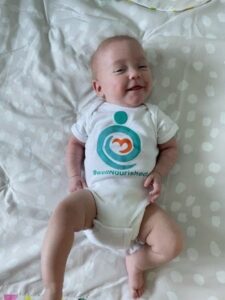 Human milk is the best diet for virtually all newborns, but milk must be fortified to meet the high nutrient requirements of very preterm infants. Current “one size fits all” fortification strategies leave some infants with gaps in macronutrient intake. We are using point-of-care milk analysis to individually target human milk fortification for hospitalized infants. In our randomized, controlled trial, we are testing whether this strategy will improve growth, structural brain development (measured with magnetic resonance imaging), and neurodevelopmental outcomes in participants.
Human milk is the best diet for virtually all newborns, but milk must be fortified to meet the high nutrient requirements of very preterm infants. Current “one size fits all” fortification strategies leave some infants with gaps in macronutrient intake. We are using point-of-care milk analysis to individually target human milk fortification for hospitalized infants. In our randomized, controlled trial, we are testing whether this strategy will improve growth, structural brain development (measured with magnetic resonance imaging), and neurodevelopmental outcomes in participants.
- Funding: National Institutes of Health – NICHD
- Related Links: Study website, CT.gov
 The Baby BEAN Project is a clinical research study aimed at improving our nutritional care of preterm infants through measurement of body composition. We hope to establish a simple and very accurate way to measure body composition and then create a growth chart that can be used in NICUs everywhere. For babies born less than 32 weeks, we also plan to measure body composition changes over time, from birth until a baby’s first birthday, and aim to learn how body composition relates to health and neurodevelopmental outcomes.
The Baby BEAN Project is a clinical research study aimed at improving our nutritional care of preterm infants through measurement of body composition. We hope to establish a simple and very accurate way to measure body composition and then create a growth chart that can be used in NICUs everywhere. For babies born less than 32 weeks, we also plan to measure body composition changes over time, from birth until a baby’s first birthday, and aim to learn how body composition relates to health and neurodevelopmental outcomes.
 Micronutrients, such as zinc, are an understudied component of the very preterm infant diet. Zinc plays a role in modulating white matter development in the brain. In this observational study, we are investigating how dietary zinc intake impacts physical growth and structural brain development among infants born very preterm. Our approach involves novel biomarkers of zinc status derived from exosomes isolated from infant plasma.
Micronutrients, such as zinc, are an understudied component of the very preterm infant diet. Zinc plays a role in modulating white matter development in the brain. In this observational study, we are investigating how dietary zinc intake impacts physical growth and structural brain development among infants born very preterm. Our approach involves novel biomarkers of zinc status derived from exosomes isolated from infant plasma.
- Funding: Gerber Foundation
 Human milk protects very preterm infants from many complications of their early birth, but the mechanisms underlying this protective effect remain poorly understood. In addition to nutrients, human milk contains myriad non-nutrient bioactive factors that may offer unique protections for the very preterm infant. Drawing from an existing repository of human milk samples and clinical data, we are investigating how bioactives such as lactoferrin and human milk oligosaccharides promote higher quality physical growth and structural brain development during the NICU hospitalization.
Human milk protects very preterm infants from many complications of their early birth, but the mechanisms underlying this protective effect remain poorly understood. In addition to nutrients, human milk contains myriad non-nutrient bioactive factors that may offer unique protections for the very preterm infant. Drawing from an existing repository of human milk samples and clinical data, we are investigating how bioactives such as lactoferrin and human milk oligosaccharides promote higher quality physical growth and structural brain development during the NICU hospitalization.
![]() High quality, evidence-informed guidelines for nutritional care that are consistently implemented provide a foundation for optimal growth and related long-term outcomes in hospitalized very preterm infants. We recognize the synergistic contributions of NICU clinicians from multiple disciplines including Dietetics, Nursing, Lactation, and Speech Language Pathology (Feeding) to drive improvements in nutritional care and outcomes. We also embrace Neonatology fellows-in-training in their unique journeys to becoming leaders in clinical care that drives better nutrition-related outcomes. Our lab collects and curates, on an ongoing basis, a large dataset of relevant electronic medical record data for very low birth weight infants. These data are used in support of quality improvement and epidemiology work, locally and in collaboration with other teams in Massachusetts and nationally.
High quality, evidence-informed guidelines for nutritional care that are consistently implemented provide a foundation for optimal growth and related long-term outcomes in hospitalized very preterm infants. We recognize the synergistic contributions of NICU clinicians from multiple disciplines including Dietetics, Nursing, Lactation, and Speech Language Pathology (Feeding) to drive improvements in nutritional care and outcomes. We also embrace Neonatology fellows-in-training in their unique journeys to becoming leaders in clinical care that drives better nutrition-related outcomes. Our lab collects and curates, on an ongoing basis, a large dataset of relevant electronic medical record data for very low birth weight infants. These data are used in support of quality improvement and epidemiology work, locally and in collaboration with other teams in Massachusetts and nationally.
- Funding: Currently seeking
If you would like to support our research, please follow the donate link below, choose “Other”, and input “The Newborn Study”.